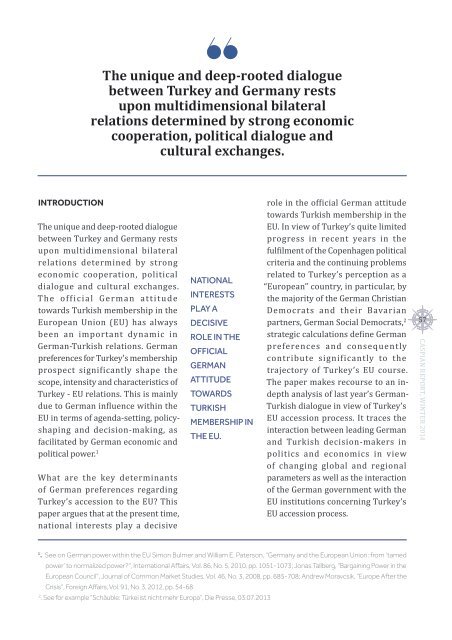Caspian Report - Issue 06 - Winter 2014
Create successful ePaper yourself
Turn your PDF publications into a flip-book with our unique Google optimized e-Paper software.
The unique and deep-rooted dialogue<br />
between Turkey and Germany rests<br />
upon multidimensional bilateral<br />
relations determined by strong economic<br />
cooperation, political dialogue and<br />
cultural exchanges.<br />
INTRODUCTION<br />
The unique and deep-rooted dialogue<br />
between Turkey and Germany rests<br />
upon multidimensional bilateral<br />
relations determined by strong<br />
economic cooperation, political<br />
dialogue and cultural exchanges.<br />
The official German attitude<br />
towards Turkish membership in the<br />
European Union (EU) has always<br />
been an important dynamic in<br />
German-Turkish relations. German<br />
preferences for Turkey’s membership<br />
prospect significantly shape the<br />
scope, intensity and characteristics of<br />
Turkey - EU relations. This is mainly<br />
due to German influence within the<br />
EU in terms of agenda-setting, policyshaping<br />
and decision-making, as<br />
facilitated by German economic and<br />
political power. 1<br />
What are the key determinants<br />
of German preferences regarding<br />
Turkey’s accession to the EU This<br />
paper argues that at the present time,<br />
national interests play a decisive<br />
NATIONAL<br />
INTERESTS<br />
PLAY A<br />
DECISIVE<br />
ROLE IN THE<br />
OFFICIAL<br />
GERMAN<br />
ATTITUDE<br />
TOWARDS<br />
TURKISH<br />
MEMBERSHIP IN<br />
THE EU.<br />
role in the official German attitude<br />
towards Turkish membership in the<br />
EU. In view of Turkey’s quite limited<br />
progress in recent years in the<br />
fulfilment of the Copenhagen political<br />
criteria and the continuing problems<br />
related to Turkey’s perception as a<br />
“European” country, in particular, by<br />
the majority of the German Christian<br />
Democrats and their Bavarian<br />
partners, German Social Democrats, 2<br />
strategic calculations define German<br />
preferences and consequently<br />
contribute significantly to the<br />
trajectory of Turkey’s EU course.<br />
The paper makes recourse to an indepth<br />
analysis of last year’s German-<br />
Turkish dialogue in view of Turkey’s<br />
EU accession process. It traces the<br />
interaction between leading German<br />
and Turkish decision-makers in<br />
politics and economics in view<br />
of changing global and regional<br />
parameters as well as the interaction<br />
of the German government with the<br />
EU institutions concerning Turkey’s<br />
EU accession process.<br />
57<br />
CASPIAN REPORT, WINTER <strong>2014</strong><br />
1<br />
. See on German power within the EU Simon Bulmer and William E. Paterson, “Germany and the European Union: from ‘tamed<br />
power’ to normalized power”, International Affairs, Vol. 86, No. 5, 2010, pp. 1051-1073; Jonas Tallberg, “Bargaining Power in the<br />
European Council”, Journal of Common Market Studies, Vol. 46, No. 3, 2008, pp. 685-708; Andrew Moravcsik, “Europe After the<br />
Crisis”, Foreign Affairs, Vol. 91, No. 3, 2012, pp. 54-68<br />
2<br />
. See for example “Schäuble: Türkei ist nicht mehr Europa”, Die Presse, 03.07.2013










